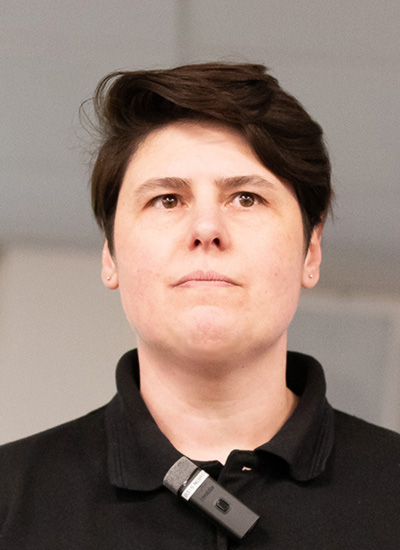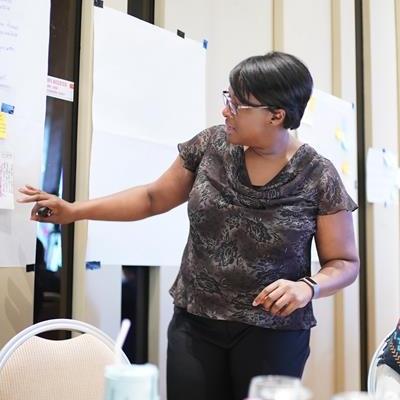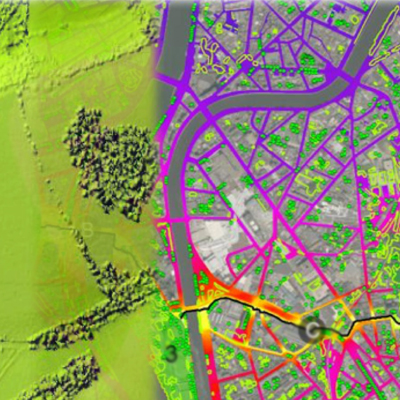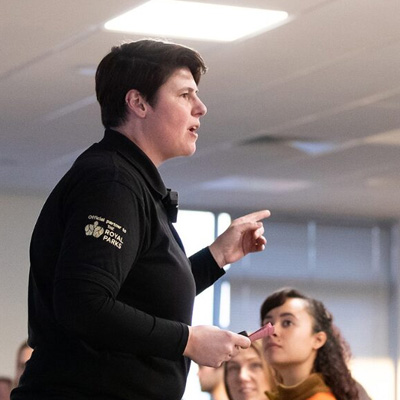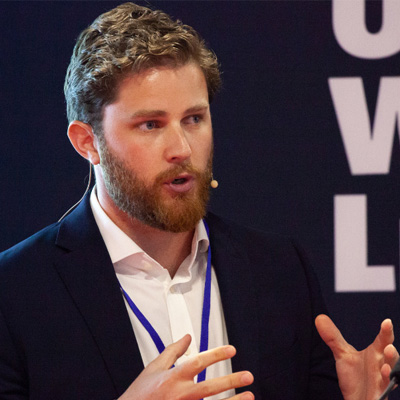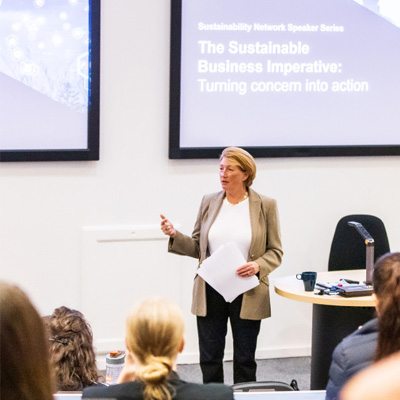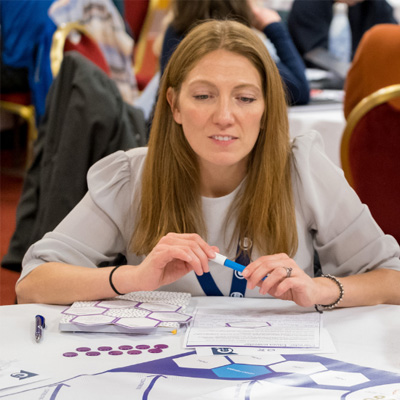The role of a sustainability professional is evolving from a specialist to a sustainability-literate change agent with a key role in setting and delivering organisational strategy that supports long-term organisational resilience and success. The Sustainability MSc brings together academics from our School of Water, Energy and Environment and School of Management to create a holistic, multidisciplinary learning experience. The course is designed in consultation with industry to equip sustainability professionals and leaders in organisations of all sizes with this critical mix of technical and management skills. It will deepen your knowledge of the theory and practice of organisational sustainability, and help you build the personal competencies you need to lead and manage change towards improved sustainability performance. On completion of the programme you will be awarded professional recognition as a Registered Environmental Practitioner (REnvP) and Practitioner Member of the Institute of Environmental Management and Assessment (IEMA) or Chartered Environmentalist (Full Member of the IEMA) depending on your level of experience prior to the course. This page is dedicated to students seeking the Sustainability MSc independent of Apprenticeship Levy funding. If you are looking for more information on our Apprenticeship Levy part-funded routes, please view here.
Overview
- Start date16 September 2025 (campus residential 16-19 September 2025)
- DurationTwo and a half years, part-time
- DeliveryTaught modules: 140 credits (70%), Thesis: 60 credits (30%)
- QualificationMSc
- Study typeOnline / Part-time
- CampusCranfield campus, Online
Who is it for?
The course is suitable for:
- sustainability professionals across management levels who are keen to improve / enhance their sustainability skills, knowledge and abilities, and lead their organisations more effectively towards improved sustainability performance,
- employees who are new to their sustainability role, whether leading or employed within a team of dedicated experts, who are keen to build their sustainability skills, knowledge and abilities, and apply these in their workplace,
- employees in other functional areas (e.g. operations, procurement, HR) for whom sustainability is becoming an increasingly important aspect of their role, and who want to build their knowledge and skills in this area, and be equipped to lead their function to align with their organisation's sustainability strategy,
- entrepreneurial individuals who are looking to develop their sustainability skills, knowledge and abilities to grow an existing business in a sustainable way, or even start a new business.
Informed by industry
The course has been designed in consultation with industry representatives from across sectors (including retail, banking, consumers goods, utilities, non-profit), academic experts and the Institute of Environmental Management and Assessment (IEMA) to ensure its relevance to sustainability roles across management levels and sectors.
The course faculty combines expertise from Cranfield’s School of Management and the School of Water, Energy and Environment, supported by a team of external industry speakers, who will bring the latest thinking and practice to the course.
Sustainability is a top priority for all our customers, and they absolutely need our help with it. The course has helped me to understand the nuts and bolts of sustainability and to become a better operator, applying the learning in a very practical way.
I can now talk competently and credibly around sustainability, and that proved invaluable just three months into the course when the King’s Coronation took place.
I chose to study this course due to the longstanding reputation that Cranfield has for practical management application, and its credibility. It brings together academics from the School of Management and the School of Water, Energy and Environment, so I knew that both technical and practical skills would be taught. I was also inspired by the co course director, Dr Rosina Watson.
The highlight of my course was hands down the people - I have made so many amazing friends throughout my time at Cranfield and I know some of them will be part of my life for many years to come. Having a group of sustainability people to bounce ideas off or sense check with is also a huge plus.
Course details
Purpose
The courses will equip leaders with the technical knowledge and management capabilities to drive positive change in their organisations and share their knowledge and experiences with their colleagues and peers.
The course aims:
- to develop sustainability leaders who will deliver real change in their organisations and play an integral role in a growing and evolving community of sustainability professionals,
- to provide students with a mix of technical and leadership (management/business) skills that will enhance their knowledge of sustainability practice and facilitate the improvement of the environmental, social and governance performance of organisations,
- to engender in students a sustainability mindset, capable of articulating the symbiotic relationship between business, society and the biosphere,
- to help students understand the market drivers for sustainability, so they can build a business case for integrating sustainability into practice, recognising the importance of creating long-term value for all stakeholders,
- to equip students to lead towards sustainability and model ethical and sustainable behaviours, and enable them to do the same in others, so collectively we can respond to the complex sustainability challenges we face with the changes required,
- to empower students and enhance their competencies, self-awareness and confidence to operate effectively as 'change leaders' and 'visionaries' in a team and to effectively communicate the sustainability agenda to internal and external stakeholders,
- to build a supportive network of sustainability professionals who share their learning and experience for the common good.
Learner journey
The course comprises of 14 taught modules and a thesis.
The course is primarily delivered online to minimise the carbon footprint of the course and enable wide and diverse participation in sustainability education. Modules are delivered live on alternative Fridays over a six-week period with students completing self-directed learning in between these sessions.
Additional elements of experiential learning, including activities such as site tours, games and coaching that take place at the annual Residential at Cranfield, which provide the opportunity for cohorts to get to know each other, network with academics and industry representatives and create enduring supportive alumni groups.
As part of the programme, participants engage in the Financial Times award-winning simulation Exploring Sustainable Futures Game. This hands-on workshop goes beyond theory, giving leaders a safe space to challenge assumptions, rethink industry structures, and act on sustainability by travelling to the future to explore long-term impacts of today’s decision-making. With a proven approach to developing change-makers, it follows four key principles: uniting diverse groups, thinking long-term, challenging the status quo, and redefining roles for impact.
The learning objectives of the course are delivered through interactive lectures, case study discussions, simulations and role play across the taught modules.
Course delivery
Taught modules: 140 credits (70%), Thesis: 60 credits (30%)
Course modules
Compulsory modules
All the modules in the following list need to be taken as part of this course.
Personal Leadership for Sustainability
| Aim |
Success in management, particularly at senior levels in organisations, depends on understanding organisations, the people in them and the relationship between the internal and external environments within which they exist; and in ensuring that they work effectively. In the context of sustainability, this is even more critical since the multiplicity of actors and stakeholders involved is especially acute, and the potential long-term benefits on society and the planet of effective leadership are so significant. Organisations are run by and for people, and the success or failure of an organisation depends on the people in that organisation. This module aims to enhance the awareness of self and others in organisations, and in the other organisations then interact with, using a variety of models and modes, such that baseline awareness allows action, and therefore leading for sustainability can be consciously and deliberately be enhanced. It is rarely an absence of planning that causes organisational difficulties; it is often the failure of management in understanding and managing complex personal, interpersonal and organisational systems that can lead to significant problems. Similarly, an acute and critical understanding of these dynamics can lead to profound and enduring success and benefit for the individual, the team, the organisation and wider society. In this module students will be introduced to various aspects of people and organisations. This module combines models, theories and ideas from organisational behaviour, psychology, management and sociology, in order to provide students with a practical understanding in recognising, understanding and utilising what has been termed the "human factor" in organisations; including ways of conceptualising organisations and how people behave within them. We shall begin to consider the impact of the external human environment; and begin to address notions of organisational change and the various ways in which leading can take place. This module will focus on application and will allow students to reflect on and apply theories and techniques in their own real-world context as sustainability professionals, utilising a structured portfolio approach in order to reflect on and ultimately enhance their own Leadership behaviours. It may also be that students will wish to undertake a work-based project or thesis in this area; several of the faculty involved will be pleased to discuss this with you. |
|---|---|
| Syllabus |
|
| Intended learning outcomes |
On successful completion of this module you should be able to:
|
Principles of Sustainability
| Aim |
Human population growth and increased resource use per capita requires improved management of our global ecosystem. Approaches such as the Sustainable Development Goals, Natural Capital, Ecosystem Services, and Planetary Boundaries provide frameworks for businesses and wider society to resolve the synergies and trade-offs between major economic, environmental, and social challenges. The Circular Economy approach refers to the development of restorative industrial systems that are grounded on the lessons of non-linear, feedback-rich ecosystems. A third approach is to explore the nexus between renewable energy, food, and other ecosystem services using per capita energy and food consumption. In this module, you will examine and critique the above frameworks and their application to resolve real-world problems and create commercial opportunities. |
|---|---|
| Syllabus |
The knowledge, skills and behaviours you will gain during this programme are as follows: |
| Intended learning outcomes |
On successful completion of this module you should be able to:
|
Leading Sustainable Business
| Aim |
The urgency of acting on climate change, biodiversity loss, hyper-social inequality, and the other myriad social and environmental challenges we face today is building. Only the businesses that respond decisively to them will survive. This module will enhance your awareness of the capabilities organisations need (including setting a purpose, assessing materiality and developing a sustainability strategy, innovating and collaborating) to steer them towards contributing to positive change whilst reducing costs, managing risk, increasing trust, and driving long term sustainable growth. You will also appraise the influence your personal leadership has on your organisation’s values and its ability to execute its sustainability strategy. You will develop and defend a proposal for a sustainability-oriented innovation which will improve your organisation’s sustainability performance. |
|---|---|
| Syllabus |
The knowledge, skills and behaviours you will gain during this programme are as follows: |
| Intended learning outcomes |
On successful completion of this module you should be able to:
|
Evaluating Environmental Sustainability
| Aim |
The need to quantify sustainability is growing in a world where scarce resources are in increasing demand and the effects of climate change are becoming more apparent. Climate change will change our capacity to meet our demands for water, food, and other resources. Almost all economic activity causes some negative impacts of the environment, either directly or through goods and services that are brought in. Mitigation methods for reducing unwanted emissions can themselves create other negative environmental impacts as side effects. Accounting for all these effects requires a more holistic approach; e.g. Environmental and Social Life Cycle Assessment. These powerful tools will help you quantify upstream and direct impacts on the environment and on society from the production of specified goods or delivery of services. Environmental Life Cycle Analysis include the better-known subsets of the Product Carbon Footprint and the Water Footprint, while Social Life Cycle Analysis support you in identifying indicators and defining measures of social impacts. |
|---|---|
| Syllabus |
The knowledge, skills and behaviours you will gain during this programme are as follows: |
| Intended learning outcomes |
On successful completion of this module you should be able to:
|
Economics of Sustainability
| Aim |
Senior managers are often presented with mutually exclusive internal investment opportunities. Therefore, to gain investment in sustainability initiatives, function managers must often demonstrate that their initiative is the best use of scarce investment funds. This ‘business case’ can be made through an appraisal of the likely costs and benefits of an initiative over its economic lifetime. This module aims to equip you with an understanding of the rationale and tools of economic appraisal to enable the construction of effective business cases. This will be achieved through a critical evaluation of economic appraisal metrics, an appropriate discount rate and the relevance of economics in the context of sustainability. |
|---|---|
| Syllabus |
The knowledge, skills and behaviours you will gain during this programme are as follows: |
| Intended learning outcomes |
On successful completion of this module you should be able to:
|
Performance Management and Reporting
| Aim |
The purpose of this module is to provide you with skills, insights, and the experience to implement and maintain an Environmental Management System (EMS) and associated audit programmes. This requires an understanding of Environmental Management Systems and associated Codes of Practice, in particular the ISO 14001 family of Standards. This module examines the methods that organisations can use to strategically govern an EMS, primarily driven by the goals and targets that can be developed as part of a monitoring and measurement programme (e.g. associated to global indices such as the UN Sustainable Development Programme, or the Global reporting Initiative). The module also provides practical insights into the development and management of audit programmes and audit activities that will provide meaningful feedback for governance teams within an organisation. The exercises and case studies within the module enable you to draw on methods and topics learnt in previous modules. |
|---|---|
| Syllabus |
The knowledge, skills and behaviours you will gain during this programme are as follows: |
| Intended learning outcomes |
On successful completion of this module you should be able to:
|
Environmental Risks: Hazard, Assessment and Management
| Aim |
Over the past decade environmental regulators and the public have aimed to improve the quality of environmental management by basing choices on reliable data and assessment. However, risk analysts often develop their competencies from their specific profession, for which the requirements can vary across industries, government bodies and geographical borders. This module aims to provide a transdisciplinary understanding of the theory and practice of effective management of all phases of environmental hazards. The module covers key topics including conceptual model development, probability, risk characterisation, and informatics. In doing so, this module aims to provide you with the capability and capacity to assess the wide range of increasingly complex risks and hazards facing organisations, policymakers and regulators. |
|---|---|
| Syllabus |
The knowledge, skills and behaviours you will gain during this programme are as follows: |
| Intended learning outcomes |
On successful completion of this module you should be able to:
|
Risk Communication and Perception
| Aim |
The aim of this module is to develop an appreciation of the importance of individual and group attitudes towards the perception of risk and how this may influence views, conduct and actions in the face of a range of risks. The module will introduce you to holistic approaches that explore attitudes to risk through sociological, psychological and cultural theories used to identify and evaluate drivers of influence and debate the role of different stakeholders with respect to risk assessment and management. You will be able to demonstrate skills in listening and entering into dialogue with different groups, employing forward-looking tools that allow you to communicate future risks to individuals and organisations. |
|---|---|
| Syllabus |
The knowledge, skills and behaviours you will gain during this programme are as follows: |
| Intended learning outcomes |
On successful completion of this module you should be able to:
|
Environmental Innovation
| Aim |
While technological change is seen as the root cause of many environmental problems, it is simultaneously viewed as the means of solving such problems. This module explores technological change as part of positive sum strategies put forward by ecological modernisers. Theories of technological change such as evolutionary, path dependent and long wave are reviewed and used to formulate technology policy to achieve environmental net gain or transition to a low carbon economy. These are then set in practical contexts such as innovation in manufacturing, ecological restoration, or low-carbon living. You will develop and justify a proposal for an environmentally beneficial initiative using and critiquing theories learned. |
|---|---|
| Syllabus |
The knowledge, skills and behaviours you will gain during this programme are as follows: |
| Intended learning outcomes |
On successful completion of this module you should be able to:
|
Sustainable and Circular Supply Chains
| Aim |
This module will introduce you to the main concepts and principles that underpin Logistics and Supply Chain Management, particularly in the context of sustainability and managing global supply chains. The module presents the fundamental principles of contemporary logistics and supply chain management within a business context. It explores the ways in which good practice in these fields can contribute to achieving sustainable competitive advantage. Additionally, the concepts of circularity and how they apply to supply chains are explored, since this represents a critical approach for organisations to future-proof their supply chains. You will experience the challenges presented by the transition from linear to circular supply chains, and devise strategies to overcome them through a simulation of their supply chains to future proof their business. |
|---|---|
| Syllabus |
The knowledge, skills and behaviours you will gain during this programme are as follows: |
| Intended learning outcomes |
On successful completion of this module you should be able to:
|
Circular Innovation
| Aim |
This module aims to introduce you to strategies and tools that enable Circular Business Model development to take place. You will gain experience of the real-life scenarios in which a holistic approach to designing/innovating for improved sustainability is required. Delivering environmental-social and economic improvements in products and businesses requires organisations to take a longer-term integrated view of their product and service policies. To support this, an appreciation of a range of tools and techniques, used to guide designers/managers responding to the requirements for more circularity of products, services, and organisational processes, will be developed. |
|---|---|
| Syllabus |
The knowledge, skills and behaviours you will gain during this programme are as follows: |
| Intended learning outcomes |
On successful completion of this module you should be able to:
|
Strategic Foresight
| Aim |
Strategic foresight supports sustainability and innovation resilience through systematic analysis of industry trends or disruptions and the development of alternative plausible futures that are applied in an organisation to stress-test options and consider different pathways to innovate sustainably. In this module, you will learn techniques that help to maintain the organisation’s competitive advantage against potential market disruption and to better prepare for future risks and opportunities, thus adding resilience, adaptability and flexibility to the organisation in an increasingly complex and fast changing world. Read blog 'Using strategic foresight techniques to think about our future food system'. |
|---|---|
| Syllabus |
The knowledge, skills and behaviours you will gain during this programme are as follows: |
| Intended learning outcomes |
On successful completion of this module you should be able to:
|
Social Entrepreneurship
| Aim |
The aim of this module is to familiarise you with the concepts of social enterprise and intrapreneurism and enable them to compare these phenomena with “traditional” entrepreneurship. Both business models overlap extensively with what is regarded as traditional entrepreneurship but have distinctively different features: while being profit-or surplus-making, their aims typically embrace social outcomes and purposes, and their distribution or sharing of value created is frequently closely linked to these achieving these. You will be introduced to the history and evolution of non-mainstream modes of entrepreneurship and will develop your understanding of how social entrepreneurs/social intrapreneurs create and operate enterprises/intrapreneurial activities in different environments. You will see how such enterprises fit within the spectrum of profit and not for profit entities, and how these are regarded by policy-makers and other stakeholders. You will emerge with a clearer idea of how you can pursue a corporate intrapreneurial initiative. The module may even prompt you to consider a future career in this business environment or aspire to found a social enterprise. |
|---|---|
| Syllabus |
The knowledge, skills and behaviours you will gain during this programme are as follows: |
| Intended learning outcomes |
On successful completion of this module you should be able to:
|
Sustainability in Practice
| Aim |
This module reminds you of the major sustainability challenges facing organisations and explores how the most progressive ones are responding in-terms of leadership and strategy, mind-set, structure, integrating sustainability into different management functions, stakeholder collaborations, environmental and social impacts and managing change. It will engage you in gaining a better understanding of how organisational action can be best configured to promote a responsible and sustainable mission. In doing so, it will demand individuals to reflect on the long-standing debates concerning the political economy and ethical management practices. The module is brought to life through its assessment in which individuals are invited to consider an organisation’s live sustainability challenge – the case challenge. The case challenge will inspire discussion and become the foundation for your problem-solving activity in order to produce a design specification for their proposed solution and present it back to the case organisation. |
|---|---|
| Syllabus |
The knowledge, skills and behaviours you will gain during this programme are as follows: |
| Intended learning outcomes |
On successful completion of this module you should be able to:
|
Practice-based thesis (individual thesis project)
| Aim |
The practice-based thesis project presents a unique opportunity for you to work on a specific sustainability issue or initiative for an organisation (your employer, or third party organisation) with the support of Cranfield University experts. The project will enable you to demonstrate application of sustainability principles to a solve a business challenge and evidence, through reflective practice, the applicability of the learning to an employer (or selected third party organisation, if not employed). Students who successfully complete their practice-based thesis will progress through to their award (MSc Sustainability). |
|---|---|
| Intended learning outcomes |
On successful completion of this module you should be able to:
|
Keeping our courses up-to-date and current requires constant innovation and change. The modules we offer reflect the needs of business and industry and the research interests of our staff. As a result, they may change or be withdrawn due to research developments, legislation changes or for a variety of other reasons. Changes may also be designed to improve the student learning experience or to respond to feedback from students, external examiners, accreditation bodies and industrial advisory panels.
To give you a taster, we have detailed the compulsory and elective (where applicable) modules which are currently affiliated with this course. All modules are indicative only and may be subject to change for your year of entry.
Teaching team
The programme is led by faculty experts who have extensive industry experience. This core teaching team are joined by industry leaders and external experts, as well as other research and academic staff from across the university who contribute to the modules and the annual Residential. The MSc is co-directed by Dr Rosina Watson (School of Management) and Dr Kenisha Garnett (School of Water, Energy and Environment). You will be taught by other academics across the university, along with a number of external contributors and industry guest speakers, including Dr Adam Faiers and Rachel Mallows, MBE
Accreditation
Accredited by IEMA, successful completion of this MSc leads to the additional award of Registered Environmental Practitioner (REnvP) status (Practitioner Member of IEMA) or Chartered Environmentalist (CEnv) status (Full Member of IEMA) depending on your level of experience prior to the course.
Your career
The need for sustainability professionals is growing as social and environmental issues become more urgent and complex and legislation increasingly focuses on clean growth and sustainable development. Understanding long-term trends and resource use, and their influence on stakeholders, will enable companies to examine the market drivers for sustainability, build the business case for integrating sustainability into practice and create more competitive business models.
Our Sustainability MSc will enable you to develop your knowledge, skills and abilities while applying what you learn directly in your workplace. The programme will support your career progression, preparing you to successfully carry out sustainability related leadership roles in the future.
Our Career services team offer: individual career consultations, speaker events, alumni networking, networking workshop, personal and executive career coaching, leadership assessment centre, and more practical skills-based workshops on writing CVs and cover letters, and interview skills.
How to apply
For more information about the course please email sustainabilitymsc@cranfield.ac.uk.
To apply you will need to register to use our online system. Once you have set up an account you will be able to create, save and amend your application form before submitting it.
Once your online application has been submitted together with your supporting documentation, it will be processed by our admissions team. You will then be advised by email if you are successful, unsuccessful, or whether the course director would like to interview you before a decision is made. Applicants based outside of the UK may be interviewed either by telephone or video conference.
Read our Application Guide for a step-by-step explanation of the application process from pre-application through to joining us at Cranfield.
Applications for apprenticeship routes have to come via the Expression of Interest form. Apprenticeship applications received via the application button on this page will not be processed.
Application deadlines
September 2025 start: 29 July 2025
